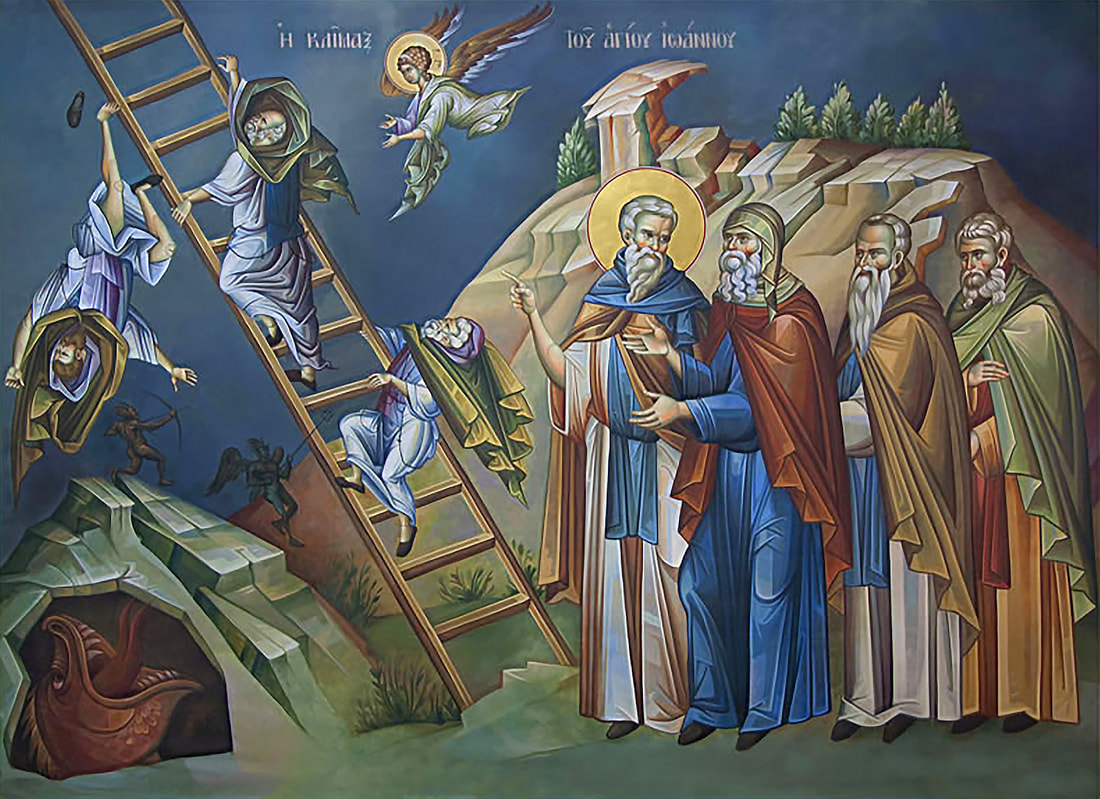|
Two weeks ago, on the second Sunday of Great Lent, when the Church remembers St. Gregory Palamas, I wrote about meditation stemming from some of St. Gregory’s teachings and its application in our lives. This week, the fourth Sunday of Great Lent, we remember St. John Climacos, or St. John of the Ladder (“Climacos” or “klimax” is Greek for “ladder”). St. John Climacos was born, likely, in the last quarter of the 6th century and died around 650 A.D. He lived a monastic life on Mt. Sinai at the monastery of St. Katherine. From his works, it is clear to see that Mt. Sinai, where Moses encounter God, and Mt. Tabor, where the Transfiguration of Christ took place, are paramount (pun intend) to his ascetical and godly thought. St. John Climacos is best known for his treatise, “The Ladder of Divine Ascent” (often referred to as “The Ladder”). This influential work was meant for monastics, living a life of asceticism and dedication only to Christ. It describes 30 steps of spiritual progression for the monastic. His work was meant for monastics. However, the spiritual progress he describes, by God’s grace, is important to all Orthodox Christians, not just monastics, seeking a more Christ-centered life.
The 28th rung of “The Ladder” is prayer. Of all the issues described in “The Ladder” or in other of his works, St. John’s emphasis in life, which overarches all else, is prayer. St. John begins the section on prayer as follows: “Prayer is by nature a dialogue and a union of man with God. Its effect is to hold the world together. It achieves a reconciliation with God. Prayer is the mother and daughter of tears. It is an expiation of sin, a bridge across temptation, a bulwark against affliction. It wipes out conflict, is the work of angels, and is the nourishment of all bodiless beings. Prayer is future gladness, action without end, wellspring of virtues, source of grace, hidden progress, food of the soul, enlightenment of the mind, an axe against despair, hope demonstrated, sorrow done away with.” I’m not sure I’ve come across a more beautiful description of the meaning, function, essence, and results of prayer. Two weeks ago, in the article on St. Gregory Palamas, we discussed the importance of meditation and what it can produce: Orthodox Christian meditation is important because our Christ-centered thoughts move from the individual from the selfish to the selfless, from the soliloquy to the dialogue. And that, my friends, is at the heart of Orthodox Christian prayer. I remember the first prayer said on my own – without prompting. I was about 5 years old. My brother and I were playing in the backyard, near a sewer in the far corner. There were lots of rocks around there and mud, and we liked to drop the rocks in the sewer to hear the splashes and play with the mud. This particular day, my brother took a rock and threw it with might against the grate of the sewer. To our surprise, the rock split! I thought I could do the same. I took a rock, and with the might of an older brother, threw it at the sewer. It bounced off the grate and hit my brother in the head. He immediately covered his face with his arm and began screaming. I could see blood gushing from around his head. I couldn’t tell where he was hit, but it was certainly near his eye. Quickly I took his arm and guided him back to the house, praying the whole time for two things, one good, one terrible: that he did not lose his eye and that I would not get into too much trouble. Thankfully, the rock hit him on his brow and his eye was not hurt. I did get into trouble. He still has the scar to this day and will often point to it when I say or do something dumb! How often do we pray only to ask for a need to be fulfilled? It would be like approaching someone with whom you would like a relationship, for the first time, and begin the encounter by saying, “Hey, can you do me a solid?” No name is used. No thankfulness expressed. No greeting. Just straight to the need. We build relationships by knowing who someone is, greeting him, thanking him, expressing joy at seeing his face. From this point, deeper understandings and profounder rapports can be realized. The same holds true with our relationship to Christ. It begins by calling out His name, greeting His loving presence, thanking Him for His beneficence, and participating in His joy. All of this starts and ends with prayer. St. John Climacos continues with his discussion on prayer: “That attitude of prayer is the same for all, but there are many kinds of prayer and many different prayers. Some talk and deal with God as with a friend and master, lifting their praises and their requests to Him not for themselves but for others. Some look for greater spiritual treasures and glory and for greater assurance in their prayers. Some beg to be freed entirely from their adversary. Some look for rank and others for relief from all their debts. Some seek freedom from prison or for charges against them to be dropped. But heartfelt thanksgiving should have first place in our book of prayer.” If we regard prayer in the manner in which St. John Climacos details, we will truly be doing our part in building a relationship with Christ – and the more we will get to know Him and love Him. It’s difficult for me to give a “one-size-fits-all” set of instructions on prayer. It’s best that each member of the Faith reaches out to a priest or spiritual father for guidance. But at least consider the following:
But it starts with picking up the “phone” and calling out by name, Jesus! Prayer is work. Do not be afraid that it can be difficult at times. St. John Climacos goes on: “Make the effort to raise up, or rather, to enclose your mind within the words of your prayer; and if, like a child, it gets tired and falters, raise it up again! The mind, after all, is naturally unstable, but the God Who can do everything can also give it firm endurance. Persevere in this, therefore, and do not grow weary…” My beloved friends, the greatest and most important achievement any human can realize is a strong, growing, and enduring relationship with Christ. Great Lent is the perfect time to start and/or continue to grow in that relationship through prayer. May our Lord and Savior Jesus Christ, through the prayers of St. John Climacos, guide us into a more perfect relationship with Him through prayer. With Love in Christ, +Fr. Nick Comments are closed.
|
AuthorsMessages written by the clergy of our parish. Archives
May 2021
Categories
All
|
© 2023
Saint Nicholas Greek Orthodox Church
3109 Scio Church Road, Ann Arbor, MI 48103
Phone: (734) 332-8200
Fax: (734) 332-8201
Saint Nicholas Greek Orthodox Church
3109 Scio Church Road, Ann Arbor, MI 48103
Phone: (734) 332-8200
Fax: (734) 332-8201


 RSS Feed
RSS Feed
